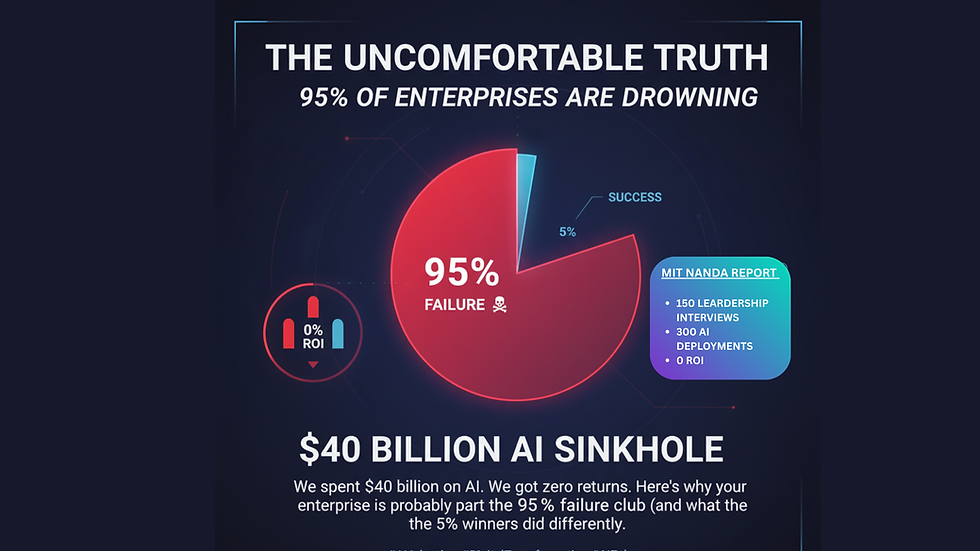The Hidden Cost of Losing Tribal Knowledge in Manufacturing
- parminder singh
- Aug 29, 2024
- 4 min read
Updated: Jun 26, 2025
When seasoned engineers retire, companies face more than just a staffing gap. The loss of "tribal knowledge"—the unique insights and troubleshooting techniques accumulated over years of experience—can have a profound impact on maintenance teams, downtime, training, and overall efficiency.

1. Loss of Critical Knowledge
Impact on Maintenance Teams
Loss of Expertise: Up to 70% of critical, undocumented knowledge may be lost with retiring engineers. This includes specialized troubleshooting techniques and machine-specific insights.
Increased Downtime: The absence of this knowledge can extend downtime by 15% to 30%, as remaining engineers may struggle to diagnose and resolve issues efficiently.
Training Challenges: Training new engineers becomes 20% to 50% more time-consuming due to the lack of nuanced understanding and experience previously held by retirees.
2. Decreased Efficiency and Productivity
Impact on Maintenance Teams:
Productivity Drop: Remaining engineers often take on additional responsibilities, which can lead to a 20% or more decrease in productivity.
Extended Downtime: Downtime could increase by an additional 10% to 20% due to potential errors and slower response times from less experienced personnel.
Training Hurdles: Without effective mentorship, new engineers may need 50% more time to reach the efficiency levels of their predecessors, further straining the team.
3. Increased Training Costs
Impact on Maintenance Teams:
Higher Budgets: Companies might need to boost training budgets by 30% to 50% to account for the loss of experienced engineers and to fund formal training programs and knowledge management systems.
Longer Downtime: Insufficient training can result in a 20% longer downtime during the adjustment period as the team adapts to the new dynamics.
Intensive Training Programs: Structured training might need to be 30% more rigorous to prepare new engineers to function effectively without direct guidance from seasoned mentors.
4. Knowledge Transfer Challenges
Impact on Maintenance Teams:
Incomplete Transfer: Research shows that only 20% to 40% of critical knowledge is effectively transferred, leading to significant gaps.
Extended Downtime: These knowledge gaps can extend downtime by an additional 15% as the team adjusts to the missing information.
Training Delays: New engineers might require 50% more time to become proficient, underscoring the need for robust documentation and mentoring programs.
Financial Implications for Large Manufacturing Companies
Revenue Impact
Downtime Costs: For a company with $1 billion in annual revenue, a 20% increase in downtime could result in a 2-5% revenue loss, translating to $20 million to $50 million annually.
Reduced Efficiency: A 20% decrease in productivity could further reduce revenue by 3-5%, leading to an additional $30 million to $50 million in lost revenue.
Total Revenue Loss: The combined impact could range from $50 million to $100 million annually.
Operational Costs:
Maintenance Costs: With a larger maintenance budget, a 10-20% increase in costs could add $5 million to $10 million annually.
Training Costs: A 30-50% increase in training budgets could mean an additional $600,000 to $1 million in expenses.
Production Delays: A 5-10% reduction in output could result in a lost margin of $10 million to $20 million.
Total Operational Impact: The operational impact could add $15.6 million to $31 million annually.
Overall Financial Impact:
Revenue Loss: $50 million to $100 million.
Increased Operational Costs: $15.6 million to $31 million.
Total Financial Impact: $65.6 million to $131 million annually.
Quantifying the Impact for Mid-Sized Companies
For mid-sized manufacturing operations, the financial impact of losing experienced engineers can be significant:
Impact on Revenue:
Downtime and Efficiency Loss: A 20% increase in downtime and a 20% decrease in productivity could lead to a $5 million to $10 million annual revenue loss.
Impact on Shop Floor Operations:
Maintenance Costs: An additional $1 million to $2 million.
Training Costs: An extra $150,000 to $250,000.
Production Delays: A lost margin of $1 million to $2 million.
Total Operational Impact: An additional $2.15 million to $4.25 million.
Overall Profitability Impact:
Revenue Loss: $5 million to $10 million.
Increased Operational Costs: $2.15 million to $4.25 million.
Total Financial Impact: $7.15 million to $14.25 million annually.
Example Calculation for a Mid-Sized Company:
Annual Revenue: $100 million.
Profit Margin: 10%.
Impact: Potential reduction in profit by 7.15% to 14.25%, lowering annual profit to $7.75 million to $8.85 million.
Retirement of experienced engineers can lead to substantial financial losses and operational inefficiencies. Manufacturing companies, whether large or mid-sized, must prioritize proactive knowledge management and training strategies to mitigate these risks and safeguard their operational stability.
ZippiAI is playing a transformative role in mitigating the hidden costs associated with the loss of tribal knowledge in manufacturing. By leveraging ZippiAI’s troubleshooting and knowledge AI Engine, companies can capture and preserve critical insights that might otherwise be lost when experienced engineers retire. ZippiAI's platform enables the digitization of nuanced troubleshooting techniques and machine-specific knowledge, creating a centralized repository that can be easily accessed and updated by current and future team members. This proactive approach helps bridge the knowledge gap, ensuring that essential information is not only retained but also continuously refined and shared across the organization.
ZippiAi’ AI-Engine X2 stands at the forefront of this revolution, offering a robust platform that understands the limitations associated with fragmentation of knowledge. Transitioning from traditional databases to AI-engine’s centralized Knowledge Base repositories marks a pivotal shift in how organizations manage and share troubleshooting knowledge across multiple factory locations.
Schedule a demo to refine your workflows and embark on a journey towards productivity and streamlined operations.




Comments